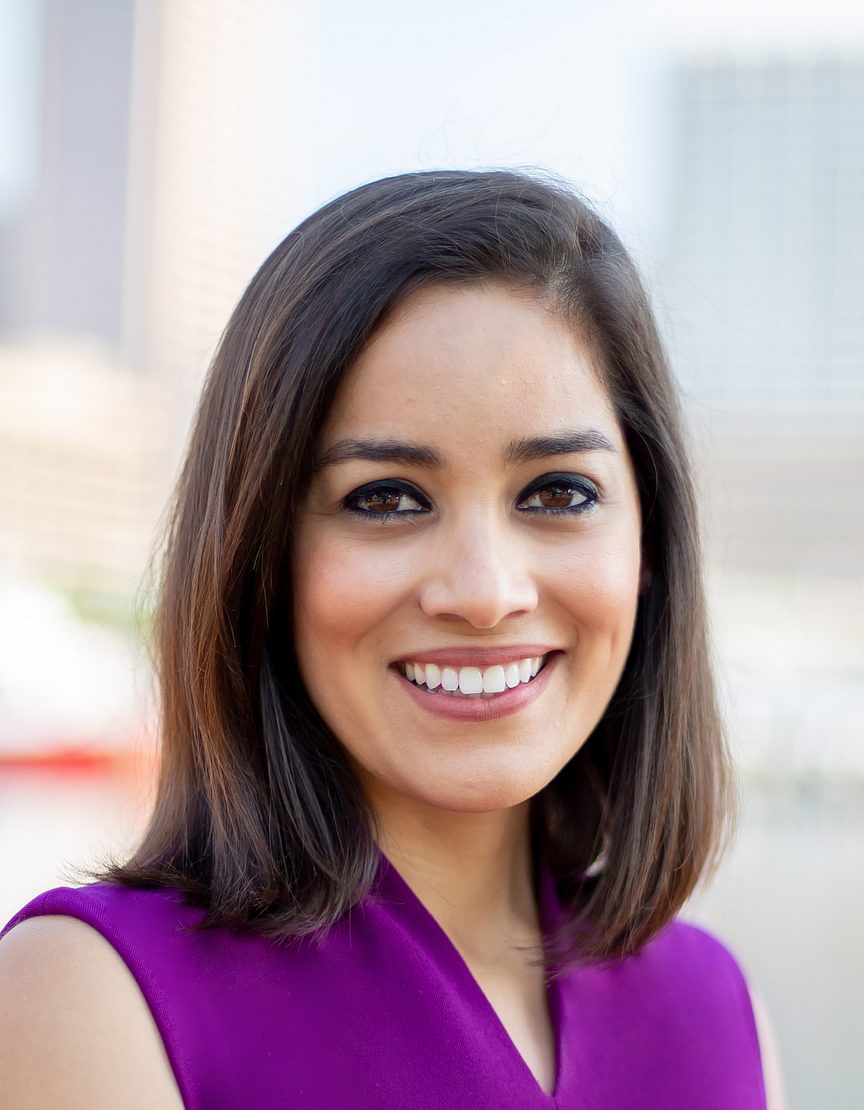
December 17, 2019
Decoding Bias in AI
How Lolita Taub ’04 is championing diversity in artificial intelligenceby Rita Savard
Flying cars. Jet packs. And Rosie the robot—a housekeeper who does it all, including helping the kids with homework.
The futuristic world of the animated sitcom, The Jetsons, piqued Lolita Taub’s interest as a young girl. Taub’s vision of the future was one informed by smart machines like Rosie. But for Taub, a Latina who has built her career on advocacy and support for gender and diversity in the artificial intelligence industry, the conversation is no longer about convincing people that the future is AI. It’s about the danger in leaving women and people of color out of the equation.
 A 2019 report from New York University's AI Institute spotlights glaring diversity problems in the artificial intelligence industry. Lolita Taub ’04 is working to change the culture and bring more women, people of color, and members of the LGBTQ+ community to develop AI.
A 2019 report from New York University's AI Institute spotlights glaring diversity problems in the artificial intelligence industry. Lolita Taub ’04 is working to change the culture and bring more women, people of color, and members of the LGBTQ+ community to develop AI.
Taub was born in South Central Los Angeles to Mexican parents who immigrated to the United States with no money and no family to go to for support. They did this, Taub says, so that their children could achieve the American Dream.
Her father found jobs as a migrant farm worker, in a door manufacturing factory, and as a truck driver. Her mother babysat and cleaned houses. “We grew up poor,” Taub says. “People used to tell me that I’d be a high school dropout and go on welfare.”
At age 34, she has a bachelor’s degree, an MBA, and 12 years of experience working in the tech industry—including high-profile positions at venture funds built on investing in women, people of color, and the LBGTQ+ community. In July, Taub joined the Baltimore-based workforce data science company Catalyte as its chief of staff.
“I’m working on my dream,” she says. “A world where tech is created and led by our population’s diversity.”
Catalyte’s novel workforce development model uses artificial intelligence to identify individuals, regardless of background, who have the innate potential and cognitive ability to be great software developers—a mission that aligns with Taub’s vision of a world “where tech is pioneered by the diversity of our population.”
The company’s blind recruitment process measures how job candidates think about problems and how quickly they can learn. Factors like education level and past experience are not considered. Those who are identified with the aptitude and ability to become great software developers are invited to join a free software engineering training program to become junior developers. Catalyte is now making its AI platform—which has succeeded in making lucrative tech jobs more accessible to people who may not otherwise find a foothold in the industry—available to large companies across the nation to create more productive and diverse tech workforces.
But before Taub was in a position to break down barriers in an industry dominated by white men, she needed to confront and conquer her own set of challenges.
In 2009, as Taub sat by her father’s death bed, he told her he wanted her to be happy. To live the life she wanted. She was 23 when he died and her focus was set on becoming the bread winner for her mother and two siblings. Unable to earn enough money on her sales executive salary, the family lost their car, their house, and went through bankruptcy. Soon after, Taub was diagnosed with pre-stage cancer. Something had to give.
On her doctor’s advice, Taub redirected her energy on her health and well-being. A year later, the cancer cells had disappeared, but it was a wake-up call.
In 2013, she was hired at Cisco Systems to lead the first internet of things (IoT) Connected Cities Project for Southern California’s Native American tribes. It was a tipping point, igniting a spark in Taub to empower and enable people to make a difference in the world through technology. She left Cisco to travel around the globe, meeting and interviewing more than 80 inspiring female millennial entrepreneurs in over 20 countries whom she featured on The F Show, a YouTube mini-series Taub created that combined both her passion for tech and women’s empowerment.
“I’ve interviewed investors, founders, and experts in the AI field—folks from startups and big companies like IBM, Microsoft, and Google,” Taub explains. “The biggest side effect has been an increased excitement of how AI can be raised to help people.”
From finding what you need on Google to getting you from point A to point B in an Uber, AI is part of daily life.
“Now imagine how AI could be used to help address our biggest challenges, like hunger, poor health, and unemployment,” Taub says. “We need to raise AI to address human challenges—and it can address those challenges—but before it solves problems, we need to raise AI to be good.”
A 2019 report from New York University’s AI Now Institute highlights the problems that occur when humans training AI largely account for a single segment of society.
At leading AI companies like Facebook, women comprise only 15 percent of the AI research staff while at Google, women account for only 10 percent. Meanwhile, at colleges and universities, NYU’s research also revealed that 80 percent of professors who specialize in AI are men.
Report authors Sarah Myers West, Meredith Whittaker, and Kate Crawford wrote: “To date, the diversity problems of the AI industry and the issue of bias in the systems it builds have tended to be considered separately. We suggest that these are two versions of the same problem—issues of discrimination in the workforce and in system building are deeply intertwined.”
Because no government agency exists to address the issue, Taub says companies developing AI need to take a hard look at addressing workplace cultures that are lacking gender and racial diversity.
She wishes Catalyte’s technology was around when her father was alive. But the workforce data science is helping others like him realize their American Dream—and providing them with the tech training to become engineers of the future.
“They are building-out careers,” Taub explains, “and getting paid a salary that can help them achieve a better life for their families, social mobility, and everything else that comes with that.”
Yes, machines can discriminate in harmful ways, but Taub also believes in their power to do good when they are programmed by a truly diverse group of humans.
“AI can augment our personal lives and be good for all people if a diverse population works on its development and training data sets,” Taub says. “If we have diversity in the creators and leaders of AI, most—and not just the elite few—will be able to leverage tech to uplevel their lives, work, and play.”
Follow Taub on her tech journey at lolitataub.co
Categories: Magazine
Other Stories

Andover’s 10th conference promotes open financial dialogue




